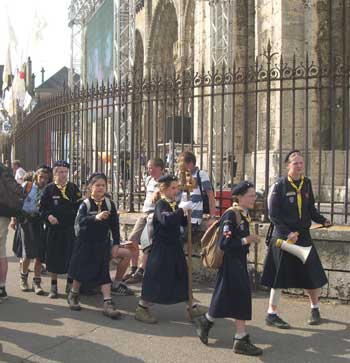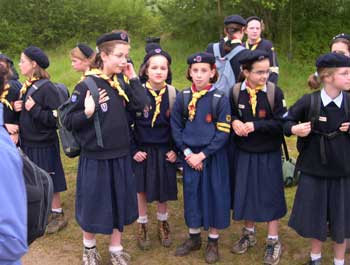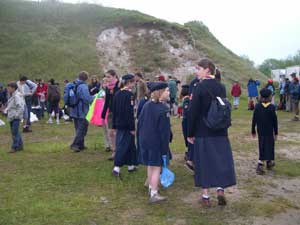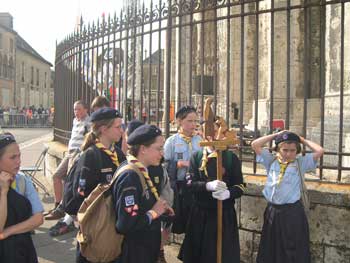|
(Except taken from "What
the Gargoyle Saw" by Michael J.
Matt)
Scouts from Riaumont
just outside the Chartres Cathedral
The
afternoon heat was almost suffocating at Chartres that
day. We’d been walking for three days, and I almost
wished my feet would once again become numb, as they’d
been earlier that day. The throbbing was as intense as
the sun’s rays. We’d slept on the ground for the last
two nights, and we hadn’t had a good meal in three days.
In the blistering heat and fatigue, my thoughts began to
wander a bit. I sat just at the base of the north tower,
but, in my mind, I returned to the road to Chartres…
I revisited the previous
day—Pentecost Sunday. The solemn high Mass was to be
celebrated in the middle of a forest; it was cool there
beneath a protective canopy of towering oaks, which, in
their own way, were as magnificent as the spires of the
Chartres cathedral. Our chapter was situated about one
hundred yards from the spacious, three-sided tent,
beneath which the Mass was to be celebrated. Having
already been walking for a day and a half, it felt good
just then to stop, sit, and collect our thoughts
Shortly before the
Tridentine Mass began, a young priest dressed in
traditional habit made his way into the small clearing
just in front of the spot where our chapter was to hear
Mass. Silently, he knelt down on the ground—and thus
began a wordless sermon, sublime as it was Catholic,
that no one who witnessed it will soon forget.
At first it was just one
little girl who approached the kneeling priest. She was
so tiny—couldn’t have been more than eight years old.
Her blue skirt was made of a sturdy fabric, and it was
ankle-length; on her feet she wore big hiking boots that
were covered with crusted mud; her blouse was light
blue, and on her head she wore a blue beret.
Around her neck and beneath
tresses of blonde hair, was a yellow scarf; and sewn to
her shirt sleeve was a badge which read:
Scouts de Riaumont.
Riaumont is a place near the
Belgium boarder where a French priest named Abbé Revet
established a center for Catholic scouts in the middle
part of the last century. When he was 13, Revet read a
book about St. Don Bosco. He never forgot that book or
the story of the great saint who gave his life to God’s
children.
Abbé Revet followed Don
Bosco’s lead, and the rest is, as they say, history.
Riaumont is located in a part of France where the Faith
suffered hideous persecution; it is also a place where
traditional Catholicism, thanks to Abbé Revet’s
apostolate, is today being raised in the hearts, minds
and souls of thousands of scouts. In the History of
Riaumont the place is described as follows:
[Riaumont is built on]...soil which suffered from the
revolutionary exactions and its string of confusions, of
destruction of monasteries, abbeys, churches, and
castles. It is also on soil which, during the two world
wars, saw the most terrible battle between men which has
left behind numerable traces….The cemetery, the
trenches, the bomb holes are today the witnesses of
those terrible hours….This is land of suffering where
our Lord threw a glance in order to allow Father REVET
to found a village. A village from where will resound
and for a long time, prayers, cavalcades, songs and
shouting of hundreds of children.
The little girl from
Riaumont whom I saw kneeling in the forest was not
technically one of Abbé Revet’s famous “scouts”
(troubled boys who are rescued by the traditional
priests and Benedictine monks of Riaumont and
transformed into soldiers of Christ). Rather, she was
one of the “jeannettes,” a scout, yes, but more refined
and gentile, as befits young ladies. Her angelic face
was made exquisite by a combination of indescribable
physical beauty and a loveliness of soul which
manifested itself through clear and blissful eyes.

At first, she positioned
herself several yards behind the priest. Kneeling up
straight as an arrow, she folded her arms across her
chest in the French way, closed her eyes, and began to
collect her thoughts.
After a few moments, the
diminutive penitent rose to her feet and approached her
confessor. She knelt discreetly at his side and slightly
behind his shoulder, and, after the priest raised his
hand in benediction, she confessed her sins.
A gentle breeze fluttered
through the treetops just then as rays of golden
sunshine somehow managed to penetrate the leafy awning
above and play on the branches below; the Mass was
underway, and, there amidst the cool shadows of the
forest, the lulling murmur of penitent’s prayer and
priestly absolution became barely audible over the
whispering breeze. One sensed that angels were near.
The Mass progressed, and, as
the Kyrie was being
sung, I noticed that two more little girls from Riaumont
approached the clearing and knelt among tall ferns that
grow there on the forest floor.
“Christe eleison…” the sung words resonated
through the trees, and the realization came over me that
we were praying with the children of the Vendeans. It
wasn’t difficult to imagine what it must have been like
for those Catholic traditionalists fighting the diabolic
French Revolution over two hundred years ago in the
forests of the Vendee. They too celebrated their Masses
in the woods; their children also knelt in groves
outside country hamlets to confess their sins. Indeed,
in woods very much like these, the forefathers of the
Catholic traditionalists spilled their blood for the old
Faith.
 The first little “jeannette”
rose up from her place beside the priest, but she didn’t
return to her chapter right away. Instead, she walked a
few paces and returned to her knees. She must have been
trained by a saint: her confession—at least in every
detail of outward appearance—was flawless. Alone, and
partially concealed behind leafy ferns as tall as she
was, she made her penance. The first little “jeannette”
rose up from her place beside the priest, but she didn’t
return to her chapter right away. Instead, she walked a
few paces and returned to her knees. She must have been
trained by a saint: her confession—at least in every
detail of outward appearance—was flawless. Alone, and
partially concealed behind leafy ferns as tall as she
was, she made her penance.
For only a moment the priest
remained unoccupied. Soon another little Catholic was
kneeling at his side. And then another and another…each
as sweet and guileless in appearance as the one before.
As the Mass progressed,
there must have been ten more who came forward to
confess themselves. They knelt at a distance far enough
removed from their chapter leaders, however, so as to
guarantee that the natural grimaces or nudges or
momentary lapses in good behavior that children are
disposed to would go unnoticed.
But there was none of that.
Each child, kneeling next to the other, treated the
sacrament and the priest as seriously as would a soldier
on his way to a bloodied battlefield. In stature, these
were little Catholics, to be sure, but that didn’t mean
that they considered their sins diminutive. Like all
good Catholics, they knew that any sin—no matter how
slight—is offensive to the Crucified.
Kneeling at the feet of Our
Lord’s representative, then, they manifested such
prayerful contrition that it brought tears to the eyes
of those who looked on.
Sophistication? Forget about
it! This was the road to Chartres. We all envied the
innocence and the childlike faith of the little girls
from Riaumont. The words of Abbé Revet are perfectly
applicable to this scene:
"The paradise of my
dreams as a man is exactly the same one as the
paradise of my dreams as a child.” One does not give
a larger treasure to a man than to have had a happy
childhood. If, moreover, these moments coincide with
a moment when he was Christian, where he was pure,
then he is saved. He will always be able to rebound.
This is one of the great strengths of the Catholic
scout movement. Later, when he is man, he will
remember.
If this is true of Catholic
scouts in more normal times, how much more is it true
today when these precious children are being trained to
live the life of traditional Catholics! Indeed, when
they are grown, they will surely remember.
Let me set the stage: From
my vantage point, I can see the little girls on their
knees and at prayer with their chaplain; they are in the
foreground. A hundred yards beyond them, in the
background, other priests are at the altar and going
about the business of worshipping God through the Holy
Mass.
Clouds of incense waft back
and forth but eventually find their way through the
sunrays and tree trunks to the place where we stand; a
happy descant for the Credo is gaily sung, incredibly,
by a choir of songbirds in the treetops. The sites and
sounds of the old Latin Mass seem to ride those golden
rays up through the foliage of this natural cathedral to
the blue sky above and straight on to heaven itself. The
scene is literally breathtaking!
To say that this was a
Catholic moment would be to utter an understatement. In
that moment there was no heresy in the world, no
Protestantism, no schism, no Vatican II, no New Mass;
there was only the present, and it was Catholic.
Always and forever, it would
be Catholic, and the old Faith was so palpable and alive
in those woods and in those thousands of dust-covered
pilgrims that one couldn’t help but embrace the joyous
confidence welling up from within the soul that the old
Faith will survive, not in the far off distant future
through some miracle, but here and now and always and
forever.
The Consecration was drawing
near; confessions would be interrupted for the solemn
observance of that greatest of all Catholic moments. But
in the short time that remained, one more little girl
took her turn at the side of the Catholic priest. Her
list of crimes must have been short, for after only a
few moments, she was up again and making her way back
through the ferns. Her furrowed brow and downcast eyes
said everything there is to say about the merits of the
sacrament.
Without so much as a glance
at her companions, she knelt, produced a rosary and
began to work the beads through her tiny fingers as her
lips silently formed the Aves. Moments later, the sound
of the bells of Consecration jingled through the trees,
and, with the exception of the birds’ happy song,
everything grew perfectly silent. God had entered the
forest.
Do you think all is lost?
That we have no reason for hope? That God has abandoned
the Church? Well, clearly you’ve never knelt in a forest
filled with thousands of pilgrims from all over the
world hearing Mass celebrated to perfection according to
the ancient rite; you’ve never watched the Catholic
girls from Riaumont going to confession in a quiet
clearing along the road to Chartres.
Take my word for it—all is
not lost and God has most certainly not abandoned His
Church. You may not find it inside the great cathedrals
here and abroad; but if you know where to search for it,
the old Faith is still thriving, even in Europe. And as
long as it thrives somewhere, there is always the chance
that, given time and God’s good grace, it will take the
world by storm once again.
Shortly after the Mass had
ended, I approached the chapter leaders who were in
charge of these “jeannettes” from Riaumont. By now the
little girls were a laughing, busy troop of merry
scouts. It was, after all, lunch time and they were
hungry. Sitting together in happy conversation as they
blithely ate their lunches, I’m sure they didn’t know
what to make of the American journalist who, with a
tear still in his eye, wanted to know all about them
and who it was who was so carefully tending the gardens
of these little souls.
But in their eyes, I saw
that flame of the old Faith which once was the soul of
Europe and the light of the world. You can’t imagine the
thrill of seeing it once again in Europe, even if only
in the eyes of little children. After witnessing such a
scene, what else can be said to describe our situation
as Catholic traditionalists other than this: At least in
some places, like the village of Riaumont, the future is
ours! |